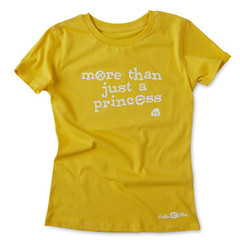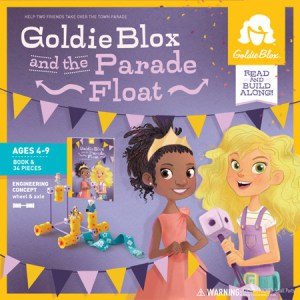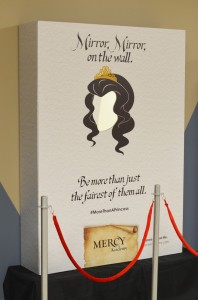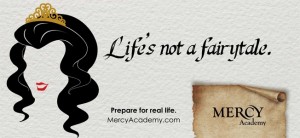My thanks to colleague Deborah Siegel for starting off what has now become an even more complicated debate over the toy company GoldieBlox. I’ve been amazed — and disappointed — at the turning tide during the past few days. While GoldieBlox’s Twitter feed implies the product is selling well, it’s also clear they’re now spinning into damage control.
Despite controversy over the product itself, everyone seems to agree that GoldieBlox took a clear misstep in their reappropriation of the Beastie Boys’ song “Girls.” For one, the late Beastie Boys member Adam Yauch left specific instructions in his will that he never wanted his work used for advertising purposes. GoldieBlox claims that the song is parody, hence “fair use,” rather than copyright infringement. But, just to make their point, they have initiated a lawsuit against the The Beastie Boys, puzzling some by this preemptive strike and causing yet more rumors to swirl that they are simply after more publicity, no matter how negative. The Beastie Boys issued an “open letter” to GoldieBlox in support of their product, but also clearly stating that the reappropriation wasn’t to their liking. GoldieBlox, so far, appears to have refused comment. Last year, Jessica Valenti wrote about the group’s “feminist turnaround,” and I’ve wondered if founder Debbie Sterling thought for this reason the Beastie Boys might be sympathetic. Whether she received bad legal advice, engaged in naïve business practices, or this move was deeply calculated is hard to tell, but there’s no doubt this development is further tarnishing the good will her company initially generated.
Criticism has also been leveled at the company for its practices during the making of the commercial’s famous Rube Goldberg machine. One point is simply that its construction was unrealistic for the ages of the girls represented. There has also been speculation that no women engineers were actually involved in its making and the “behind the scenes” videos which they released online hardly showcases the girls featured having any agency in its construction, despite the fact that none are models and are all supposedly initial testers of the product. GoldieBlox has disputed that the Rube Goldberg machine was made chiefly by male engineers, but in each of the “behind the scenes” clips released women are conspicuously absent. Here in L.A. where “industry talk” is thick, more unscrupulous scuttlebutt has emerged about the sources of the commercial’s filming which has hardly helped the product’s reputation. The tide has turned from those who zealously cheered the company on to a general sense of disappointment.
https://www.youtube.com/watch?v=sfxHhTHcoTg
Yet, what the whole product launch, from Kickstarter to present-day debacle has revealed is intriguing. One point of interest to me is how GoldieBlox’s contention that they are taking originally misogynistic lyrics and ‘subverting’ them into a pro-girl message seems to parallel the larger critique of their toy, highlighting what some see as damaging short-sightedness purportedly used for greater gain.
As Deborah writes, and many of our Brave Girls Want colleagues have so articulately expressed is that GoldieBlox seems to have stepped backwards from what was first presented on their Kickstarter campaign, where a very sincere Sterling talked about giving girls options beyond “pinkifying” STEM-related toys for the girls’ aisle. When I first saw the campaign, I was excited. And I was hopeful, although there were things that concerned me. For one, Sterling’s essentializing view that her strategy came down to “one simple thing: boys like building and girls like reading.” Really? This comment seemed like odd stereotyping from someone whose purpose is to break down a gendered divide. In an article last year about the product, her remarks about how girls “care about nurturing” also seemed suspiciously stereotypical.
Sterling’s casual remark might be at the root of where many (but not all) think her product went astray. She reiterates “every girl you know is so much more than a princess” and in the now famed YouTube commercial the three young girls look painfully bored while passively watching three tiara-wearing and scepter-waving pink doppelgangers. This phrase “more than just a princess” also bedecks the T-shirts the girls wear when they storm Toys ‘R’ Us in this video.
Pivoting on the idea that all girls are told they are princesses, sold a “princess bill of goods” (and, of course, actual goods), yet can be turned another direction seems to be where Sterling has staked her foundation. Her inclusion of princess-themed material within the toy, as Deborah writes, and so many others have usefully analyzed, is what has caused critics to speak out and withdraw support. And this seems to be where Sterling seems most baffled and defensive, with the complicating thought that rejecting princess culture altogether is a way of denigrating girls and withdrawing an option that they might sincerely want.
Watching this saga unfold, what I found most insightful has been keeping a close eye at the comments churning out under each story, or comment thread, notably on the GoldieBlox YouTube page (with over 8 million views, a week ago). The point of view presented by Sterling, most often, is what has been largely supported, with detractors in the minority. It’s cheering to know how many people desperately want this type of product for their daughters. There is a palpable sense of relief many expressed which I take as a positive sign of general fatigue with the limiting products marketed to girls. There seems to be real joy in finally being able to offer girls something — GoldieBlox — considered innovative and cutting edge with lots of support for Sterling’s “good intentions.” It also seems clear that many think that giving girls some princess-themed “hook” is just fine since this reels them in. You’ll lure more girls in by pinkifying the product is their thinking (and Sterling’s it seems) and then surprise-attack the girl playing with it that there’s a new activity literally at hand, perhaps even a new world opening up.
Fairly prominent was still the “so what?” response, maintaining that it’s “just a princess” or just a bit pink and girls aren’t defined just by this. So what if this is included, as a “naturalized” view of princesses and pink culture is seen as part of any product for a girl, with the flip argument that girls will summarily reject products if that don’t subscribe to this. More reactionary is the worrying expression that eliminating princesses from girls’ toys is an unfair and even anti-feminist move, that bleaching pink from the palette available to girls is an ever worse form of reverse stereotyping. Common enough was reactionary pushback to being told girls shouldn’t have pink or this product isn’t “progressive” enough, when, as many parents wrote, their girls did naturally gravitate to the color.
“Natural,” of course, is deeply vexed issue for those of us who think hard about these topics. For many parents who responded, the line between what girls are being offered and what girls are being denied seemed confusingly thin. I completely understand the point of view of those who are turned off by the product’s princess-themed story and see hypocrisy in Sterling’s mixed message, which, worse yet, is undermining. I think the bait and switch is what is most maddening to me, as I wrote about with the Monster High line in the past.
Within my academic work in the past few years in Girls’ Studies I’ve studied what I’ve come to call “fauxpowerment” — products or programs that purport to serve girls (often for economic gain or free publicity) while, in fact, deploying undermining and essentializing messages in the most disheartening ways. I’m disappointed that GoldieBlox has taken the path it has, although this feedback seems useful as a gauge of the set beliefs that are largely shared about what girls want and, simultaneously, what they are denied. It’s crucial to remember that while these toys will shape girls’ attitudes about gender, it’s the parents who purchase them, hence responding to their own limitations is critical.
Perhaps new to the world business, (and giving her the benefit of the doubt), Sterling’s work now seems to be causing more negative talk than good, although there’s no doubt it’s got people talking. Despite a steep rise in clubs and advocacy groups to increase girls going into STEM fields there is a lot of work to do. This ridiculous and insulting video, produced under the guise of “speak their language to lure them in” received such negative feedback it was finally (thankfully) pulled. I want to be hopeful that, in the hands of girls who might receive GoldieBlox over the holidays, there is some net gain in having them even begin to associate the words “girl” and “engineer.” Like last year’s intervention with Lego’s LadyFigs line, I want to believe Sterling will get this message as well.
I’m glad to see the conversation this controversy has stirred, particularly from parents who are trying to parse princess world and what this means for their daughters. Many seem bewildered by which choice to make and fear their daughters will reject or be ostracized if she chooses, or if they offer, outside of the “pink box.” The sense of longing in many women’s comments about how much they wish something like this been around in their girlhoods has also been striking.
This past week an advertisement for Mercy Academy, a small Catholic private girls’ school in Kentucky also went viral with their slogan “You’re Not a Princess.” Mercy also uses the trope of the princess in its campaign, but only to offer it as a traditional narrative that is better off rejected in favor of girls taking charge of their own stories. Its reception was been roundly cheered.
I was struck by the boldness of this slogan which isn’t trying to spin or hedge or translate the cultural message that being a princess is okay for a girl, or even that she can be “more than a princess.” “Prepare for Real Life” seems to be the school motto as their message flat out refuses the princess stereotype. If only GoldieBlox could have been so bold.







Comments 9
The paradox of GoldieBlox | Memoirs of a SLACer — November 27, 2013
[…] Update: See also Elline Lipkin’s take at Girl With Pen. […]
Jen Bilik — November 27, 2013
I always love Elline Lipkin's writing. And she noted what I haven't seen elsewhere in the press: "GoldieBlox has disputed that the Rube Goldberg machine was made chiefly by male engineers, but in each of the 'behind the scenes' clips released women are conspicuously absent. Here in L.A. where 'industry talk' is thick, more unscrupulous scuttlebutt has emerged about the sources of the commercial’s filming which has hardly helped the product’s reputation."
Deborah Siegel — November 27, 2013
Elline, thank you for so smartly expanding the conversation - and updating us all on the latest GoldieBlox developments along the way. What an interesting case study this all is. I remain intrigued by all the directions this conversation takes and am delighted that we - and so many - are having it. Onward we go!
How We All Got Duped | Hothouse Magazine — November 29, 2013
[…] Growing up in the same family today, my presents under the tree would look completely different, because toys have become so extremely gender segregated over the past twenty years or so. Patriarchy was just as evident in the early eighties as it is now, and God knows that even with toys as they were I absorbed the message about what kinds of people held the most power in the world. So why has everything grown so pink and separate? It didn’t just magically happen—these are products and advertisements designed by human beings. Kids haven’t changed, but today’s girls are sold a softer, pinker, less serious version of everything. In fact, that formula seems to be required in order for the product to succeed in the mainstream market. (Ahem, GoldieBlox.) […]
Heather Hewett — December 2, 2013
Thanks, Elline, for such a thoughtful post. And what a useful word you have coined: "fauxpowerment." I hate that we need it, but I have started to use it. It cuts right through to the problem!
Diana — December 4, 2013
I didn't grow up playing with dolls or toys, just books, so I don't know much about them. But, I'm just wondering, why can't toys be gender neutral? Instead of pinky-fying "boy's" toys, can we just have a picture of both girls and boys on the same product?! Another thing that bothers me is how the focus seems to be on "letting girls enter the boys' world" - letting girls play with boy toys - although the point is that these toys shouldn't be gendered in the first place?! What about the other side of the equation? "Letting" boys play with doll houses? No? That's not desirable because playing with "girls" toys is inherently...degrading? Inferior? I'm sorry if my thoughts aren't clear...
pobierz — January 22, 2014
You are so interesting! I don't suppose I have read anything like that before. So good to discover somebody with a few unique thoughts on this topic. Seriously.. thank you for starting this up. This web site is one thing that is needed on the web, someone with some originality!
GoldieBlox On the Block Again — November 7, 2014
[…] advertisement, which won a coveted 2014 Superbowl spot, engendered even more outrage as claims that the girls shown “building” the Rube Goldberg machine did little of the actual […]
Breaking Down the Pink Aisle/Blue Aisle Barrier — December 23, 2014
[…] attempt to lure them past masculine associations with STEM fields does nothing but backfire, nevermind is ultimately undermining. This seems to be the pivot point for those who support diversifying the colors, (and stereotypes […]